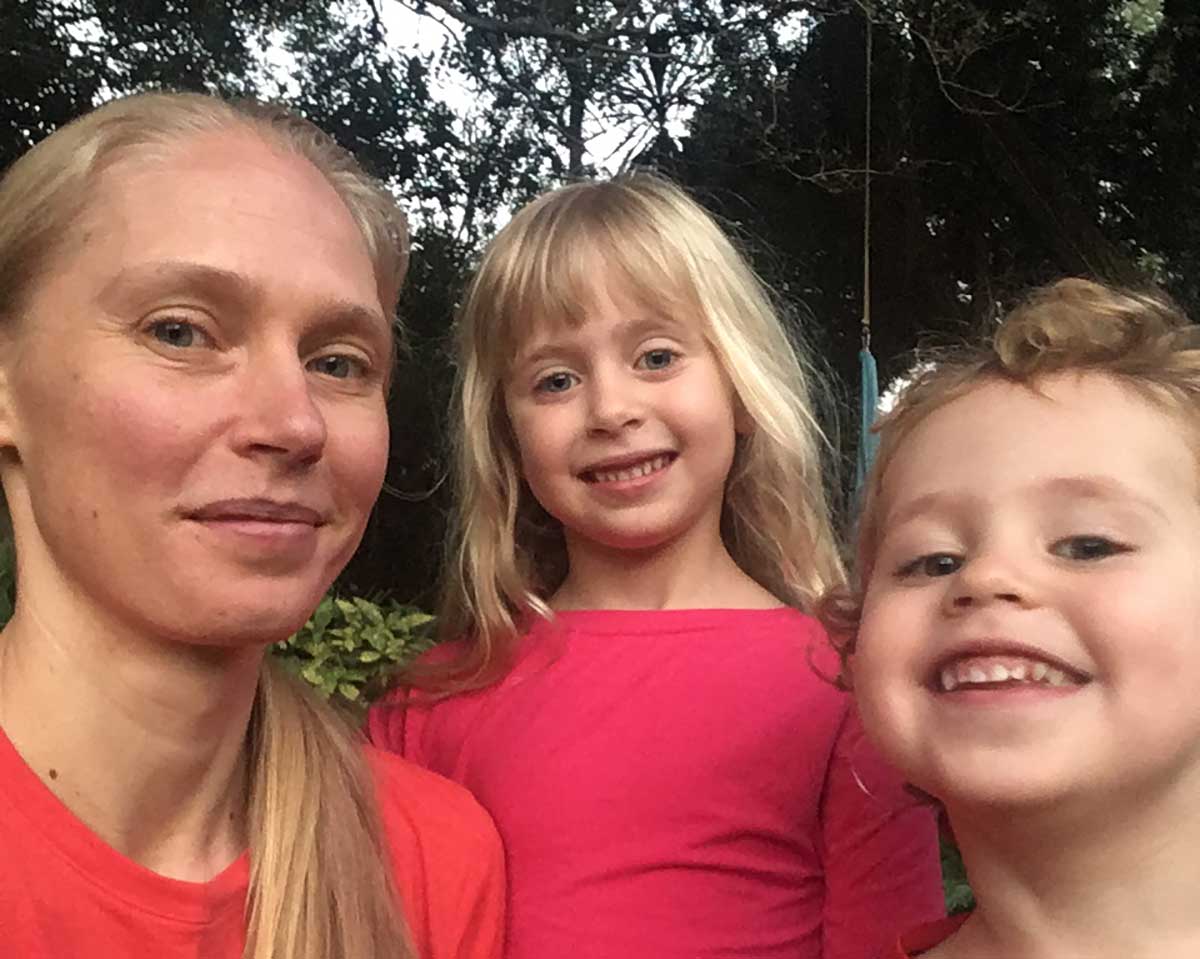EDITOR’S NOTE: The Expositor first caught up with the Island expatriates interviewed below in the April 22, 2020 edition of this newspaper, near the pandemic’s start. Reporters reached out to them again, and two more former Islanders too, almost nine months later, to see how they were faring in their respective surroundings. Amanda Flanagan, who resides in Kenya, could not be reached for follow-up comment by press time Monday.
Esther Anstice
London, England
Esther Anstice has a lot of time on her hands these days as much of the pomp and circumstance that often takes place at London’s St. Paul’s Cathedral, where she is employed as a deputy head verger, are on hold. Ms. Anstice is a former Expositor staffer and Tehkummah first responder where her family operates a dairy farm.
“We have re-entered lockdown on the fourth of January,” she said when contacted by The Expositor about her experiences in Old Blighty during the pandemic. “This is the third national lockdown and the restrictions are very similar to the first national lockdown.”
When The Expositor first spoke to Ms. Anstice, she noted that St. Paul’s Cathedral was not closed, per se, but activities were very restricted. “We are open for private prayer and led worship.”
Staff such as Ms. Anstice are on England’s “furlough scheme,” much like Canada’s efforts to shield the population from the impacts of the pandemic. “We are operating with a very reduced number of staff.”
Since that conversation, Ms. Anstice followed up a couple of days later with an update.
“I wanted to let you know that since our chat, the cathedral has taken the difficult decision to close completely in order to protect the safety of staff and to prevent people from gathering,” she said. “With close to one in 20 Londoners potentially being sick with COVID right now it’s a sad but necessary decision. I understand this will continuously be reviewed and hopefully we can reopen for at least private prayer soon but for now I will be staying home.”
The situation is extremely serious in England, the worst it has been since the pandemic arriving on England’s shores. Even before that latest update the situation was on the upper scale of serious. “One in 20 here have it and there were 68,000 new cases today—1,300 deaths. It’s exploding in a very different way. It is very scary here right now,” she shared in the earlier conversation. “Paramedics are getting over 800 calls a day.”
In the first lockdown, ambulances had been instructed to not transport patients if they did not appear to have a hope of survival. “It was a hard decision, but people were getting in an ambulance and that was the last time their family would see them,” she said.
Ms. Anstice said that, being young and fit, she does not fall into either of the categories most heavily impacted by the virus, but she remains extremely cautious. “I am not interested in getting it,” she said. “I know people who have it.”
But hope has come with the news of effective vaccines and with several months’ experience in dealing with the virus, outcomes have been getting better. “There are two new drugs that are proving effective—so there is some positive news.”
As for coping through the day, Ms. Anstice has found something that helps. “Turn the news off,” she laughs. Instead of focussing on the things that she can’t change, Ms. Anstice turns her attention on the things she can do. “You have to focus on the things you can manage,” she said.
Keeping things bottled up is not a solution, she advises. “It’s okay to cry,” she said. “It’s okay to feel things. There’s a camaraderie in that.”
Adding to the unnerving atmosphere is that there is currently a cold snap taking place in England, with its accompanying effects that in normal times would go unremarked. “It’s a damp cold and you get the sniffles,” she said. Like many people who have watched the pandemic unfold since early 2020, Ms. Anstice wonders if her past chills were symptoms. “I have no idea whether I have had COVID or not,” she said. But she remains in good health and spirits.
As for filling all that extra time? “I have been watching Netflix like it is going out of style,” she laughed. “We are going for a walk on the Isle of Dogs.” The Isle of Dogs is a large peninsula bounded on three sides by a large meander in the River Thames in East London.
“Another thing about the lockdown is that I have been learning new skills, like grocery shopping online,” said Ms. Anstice. “I have booked a slot for delivery in 10 days.” Ten days? “Yes, but it will get better,” she said. “The shops are still open, in fact one of my flatmates just went shopping, but there are a lot of elderly and vulnerable people who are not venturing outside right now.”
“I am also learning to keep track of my freezer food,” she said. “Knowing what I have and using it. We do indulge in a take-away now and then.”
The early shortages have abated and the concerns engendered by the Brexit separation from the European Union have lowered considerably with the news of a new trade agreement.
Ms. Anstice has her eye on the future and a philosophy that helps to sustain her in the meantime. “All we can do is be as kind as possible,” she said. “We will get through this together—even if we have to remain apart for now.”
Beth Ferguson-Ruzika
Dallas, Texas
Beth Ferguson-Ruzika was not part of our April series on Island expats’ experiences with the COVID-19 pandemic, but The Expositor caught up with her to see how things are going down in her adopted home of Dallas.
“Life is not all that different than normal,” said Ms. Ferguson-Ruzika.
Ms. Ferguson-Ruzika, who grow up in Honora Bay at Silver Birches Resort, first moved to the US about 20 years ago, expecting to spend a few years at her new job south of the border. “Then, you know how it is, I was in my 20s, met a guy, got married, started a family. I married a guy in the navy, so we moved around quite a bit. We had been living in the DC (District of Columbia, home to the US capital Washington) area, but we moved to Texas because this is my husband Joe’s hometown.”
Ms. Ferguson-Ruzika works for a pharmaceutical company with a focus on clinical studies, so she has had an up close and personal view of a number of studies on treatments for the disease caused by the COVID-19 virus. “We’ve been kept very busy,” she said, noting that hers is “not an area (of medicine) that people talk about.” Times have definitely changed.
People in her area seem to be divided on the question of responses to the COVID-19 pandemic along partisan lines. “As you probably know, Texas is a red state (Republican leaning),” said Ms. Ferguson-Ruzika. “I am in Dallas and people here are wearing masks for the most part,” she said. “Out in the countryside, not so much.”
One of her sons plays in a flag football league and they had a tournament right after Thanksgiving at the AT&T Stadium. “It’s a big stadium, but there were only around 500 to 1,000 people there,” she recalled. “They had the seats taped off with zip ties in groups of two or four and there were attendants going around yelling at people to ‘mask up.’ They also were admonishing attendees to not remove the zip ties that had been installed.” Unlike Toronto where her sister Jenny lives, amateur sports remain pretty much in full swing—as are professional games.

“There are definitely a lot of people who are suspicious of the government,” she said, “a lot of conspiracy theory followers.”
The virus has been anything but a leveler in her area, however. “We are almost an exact 30-30-30 split—Hispanic, African American and white. The hardest hit is definitely the Hispanic population.”
Ms. Ferguson-Ruzika notes that community is most prevalent in the service industries and are more likely to live in extended multigenerational family units. “You also see a high rate of type II diabetes.”
Her children attend school and although it was virtual to start, it is now largely reduced hours in-class. “I’ve got a daughter in Grade 5 (Emma) and a son in Grade 3 (AJ), and they attend our neighbourhood elementary school, Lakewood Elementary, which has 1,110 kids in Kindergaren to Grade 5. The Dallas Independent School District (DISD) delayed the start of school from August 17 to September 8 for this year and started virtually,” she said. “The governor had agreed to provide funding for school districts to operate virtually for up to eight weeks from the scheduled start of school. That meant DISD needed to at least offer an in-person option by October 5. Since Lakewood has so many kids to start with (largest elementary school in DISD) and in a survey by DISD over 80 percent opted to return in person (the only schools that were going to have more in-person attendees were three high schools), when DISD started in-person school, Lakewood was the only elementary school that had to follow a hybrid model (1/2 days). That lasted for four weeks and then somehow they managed to maneuver things to allow longer days, but even now, Lakewood is the only school still following an adjusted schedule (shorter days).”
The changes have left her scratching her head. “The strangest part,” she exclaimed, “the main activity removed to create a shorter day was recess.”
Ms. Ferguson-Ruzika said that she missed coming to Manitoulin terribly this year. Not only to be able to see family and friends, but to avoid the Texas summer temperatures. “Today is nice, around 17 degrees,” she said (speaking in Canadian Celsius). “In the summer it gets up over 40.”
Medeine Tribinevicius
Johannesburg, South Africa
Medeine Tribinevicius of Central Manitoulin now makes her home in Johannesburg, South Africa. A former co-op student at The Expositor, Ms. Tribinevicius has travelled widely with her husband Rick before landing in South Africa just prior to the death of former South Africa president Nelson Mandela, an event which she covered for this paper. She is the daughter of Central Manitoulin councillor Al Tribinevicius and his wife Aldona. The Expositor checked in with Ms. Tribinevicius early in the pandemic and touched base with her recently to discover how she and her family are doing and if things have changed much since her decision to shelter in place there rather than to return to Canada.
“The borders have opened to international travel with proof of a negative COVID test in the 72 hours prior to departure,” she said. “This was a big shift at the end of 2020, making it easier to restart the tourism industry here and allowing more people to resume more normal lives. My kids returned to school to finish the year and certain other restrictions were lifted. But recent developments have shifted this again.”
As for lockdowns, Ms. Tribinevicius noted that while the lockdowns were lifted, recently “certain restrictions have been reinstated. To try to curb the spread during the holidays the government instituted a curfew, banned alcohol sales and placed restrictions on public space access (specifically beaches) just before New Years. We are having another announcement from the president tonight, so this might change again and most likely get even stricter.”
Her region of South Africa experienced a bit of a lull for a while, she said, “but we are now fully in a second wave. There have been major hot spots along the coast and in the southern part of the country and the peak is expected to happen in Johannesburg in the next two weeks as people return from their holiday breaks. There is also a new variant that is thought to have originated here that is, unfortunately, thought to be more infectious. We are under increased restrictions including a curfew from 9 pm to 6 am (essential workers exempted), a ban on alcohol sales, increased restriction on gatherings, closure of beaches in most provinces, closure of city parks and other outdoor areas (dams, rivers, etc.) to prevent celebratory gatherings.”

News of the vaccines has been greeted positively in general, “but tempered, unfortunately, by the knowledge that the government has only secured very minimal doses and that the likely rollout of widespread general population vaccination is years away. There was good news recently of 1.5 million doses secured from Serum Institute in India and the country has secured participation in COVAX, but these are not sufficient for the population here.”
COVAX is one of three pillars of the Access to COVID-19 Tools (ACT) Accelerator, which was launched in April by the World Health Organization (WHO), the European Commission and France in response to the pandemic. COVAX brings together governments, global health organizations, manufacturers, scientists, private sector, civil society and philanthropy with the aim of providing innovative and equitable access to COVID-19 diagnostics, treatments and vaccines. The COVAX pillar is focussed on the latter. It is a global solution to the pandemic ensuring that people in all corners of the world will get access to COVID-19 vaccines once they are available, regardless of their wealth.
Despite that, “there is also the problem of funding—there is little faith in the government due to high levels of corruption in recent years.”
On the day-to-day living front, Ms. Tribinevicius is currently working from home but will start going into the studio in the near future as nursery schools re-open following the December holiday. “Public schools are only opening the last week of January,” she said. “Like most places, childcare has been an issue. Much of my work has shifted to online meetings and will continue for the near future.”
“For the time being there are no movement restrictions, except for the curfew,” she said. “I drive, so that makes it easier. Public transit is not great here and overcrowding is definitely a cause for concern in regards to potential COVID transmission.”
“Our household was all tested over the holidays due to close exposure to a positive case,” said Ms. Tribinevicius, “fortunately that person had a mild illness and has fully recovered and no one in our household was sick. We have close friends who are currently ill with more severe symptoms, though no hospitalization. It is certainly quite close and we are all reminded that we need to be vigilant to follow public health protocols.” Much like recent experiences for many on Manitoulin.
“We are able to connect online—our connection at home is good,” continued Ms. Tribinevicius. “I tend to message or call rather than video call, but the kids enjoy seeing grandparents on the screen. We definitely miss our family and friends in Canada.”
Giovanni Capriotti
Toronto, originally from Rome
Former Expositor photojournalist Giovanni Capriotti’s family lives in Rome, where he is from, and said Italy is back into another total lockdown as it sees hundreds of deaths and tens of thousands of new cases each day.
This past summer, his parents enjoyed a loosening of restrictions—especially his mother, who spent time at the beach with friends. Some of the relaxations, though, may have been too casual, in Mr. Capriotti’s opinion.
“For example, Canada didn’t give permission to open clubs in the summer. Some of them did (open) in Italy, so many reasons to the spike of infections now could be related to the type of summer they had there,” he said.
One element of the Italian lockdown that Mr. Capriotti praised compared to the Canadian structure is its use of strict rules that are often enforced, versus Canada’s pandemic restrictions that seem to function as more of a suggested policy.
“A lot of these restrictions may seem odd and unnecessary to the larger audience; however, it’s just a way to prevent people from piling up on each other … you’ve got to read people’s intentions and got to do strict rules,” he said.

Mr. Capriotti admitted that the restrictions were starting to bother him. The photographer travels the world for photo documentary projects and has been constrained in those aspects of his creative work.
Despite his own angst, though, he said he understood the importance of the restrictions and could not wait for his opportunity to take a vaccine for COVID-19.
“Give me the shots, set me free, even though I’m aware we’ll still have to follow the rules for a while after the shots. I just want to get back around the world doing what I love to do,” he said.
Lauren McCormick
Medellin, Colombia
Lauren McCormick, formerly of Manitoulin Island and now calling Colombia home, has seen the COVID-19 pandemic through both the Canadian and Colombian response styles.
Many parts of the Colombian restrictions relaxed during the summer when a small lull emerged between the first and second waves of the virus, including offering residents more days when they could leave their homes.
“When we were in strict lockdown, we had to stay in the house and police were patrolling the streets. When you needed essentials, you had to register in a database and the police would check your IDs,” she said, adding that different parts of the country faced different restrictions, similar to Canada.
Ms. McCormick said the government tried a few small measures such as a few tax-free shopping days to stimulate the economy, but case counts quickly multiplied and the country went back into lockdown.
The photographer returned to Canada for a few months this summer to shoot a handful of small weddings that proceeded despite the pandemic.
“The year ended up being a lot busier for me than expected. I still managed to retain about 50 percent of the weddings I had originally booked this year,” said Ms. McCormick, who told The Expositor last year that she was unsure if she would get any photography business at all.

Her plans for the downtime, which never ultimately came to fruition due to the unexpected busy season, were to revamp the back-end of her website and spend time launching side businesses with her partner Eric.
Making the decision to return to Canada for work was stressful. She figured it would be safest to remain where she was, but once word began to emerge that many of her weddings would be going ahead, she managed to find a flight to Canada that would still allow her enough time to self-isolate for two weeks.
Ms. McCormick had to take government-arranged transportation to the airport and underwent a half-dozen screening check stations in the process. Further protocols took place upon returning to the ground in Canada in the early summer.
“Things were really clear; I thought it was a very thorough process. I was asked for my plans for quarantining and they wanted a lot of details about it, like contact details, the address, phone number and my cell number, as well as how I was getting home, how I’d get groceries and stuff like that,” she said.
She stayed with her dad in Ottawa, where she quarantined in a bedroom with an adjoining bathroom. Her dad set up a mini fridge for a few food items and dropped off dinners outside her door.
“Two weeks inside the room and not leaving at all was intense, but also coming from three months being in my home in Colombia, it didn’t make much of a difference,” she said.
Her partner joined her in Canada in late September; the two have since left the country again.
Some differences stood out to Ms. McCormick between Colombia and Canada. Masks are mandatory at all times—even outside—in Colombia, versus the suggestion of wearing masks whenever physical distancing cannot be guaranteed in Canada. However, she noted that the two countries were in different stages of the pandemic when she travelled.
Ms. McCormick did not lose all of her business-planning time despite having a few small weddings and elopements to shoot. She has launched a new venture with an Ottawa wedding planner that arranges custom elopements in that part of the province. These are generally outdoors and involve fewer than 10 people, so they align well with pandemic restrictions and don’t hold people back from getting married.
“It’s been months in the making and we just launched it in the last couple of weeks. It’ll be fun to see where it goes next year; we’ve already had a lot of interest in it and it’s a nice way to adapt with the times,” he said.
The other possible venture that she mentioned in last year’s Expositor story, a fully sustainable-made clothing venture alongside her partner, proved to not be viable because most suppliers had to focus on meeting their existing contracts.
Anita Crombie (Stephens)
Watheroo, Western Australia
Anita Crombie (Stephens), daughter of Central Manitoulin Mayor Richard Stephens and formerly of Providence Bay, has been living in Watheroo, Western Australia since 2008 with her husband Tim and sons Ryan and Liam, 11 and nine years old respectively. Ms. Crombie’s background as a teacher gave them a strategic advantage as she was able to pull the boys out of their school when the first wave began to hit the world last year, switching to a home-school model.
As it turned out, the school (which only supports 12 kids from Senior Kindergarten to Grade 6) closed two weeks later.
The move to home-school on the family’s farm allowed them to bubble as a unit, including with Ms. Crombie’s 79-year-old father-in-law.
“Being on a farm, not too much changed for us. We still had freedom to be outside all the time, riding horses, bikes, go karts, walking etc.,” she told The Expositor.
Cousins in Perth (a city of about 2 million people, two-and-a-half hours from Watheroo) came to the farm and quarantined to form a larger bubble, giving the children more socializing, outside and at a distance.
“Still, the grocery store shelves were empty, not only local panic buying from the grocery stores 40 minutes away, but people from Perth were driving into the country and wiping the stores out,” said Ms. Crombie.
When that took hold, officials put rations in place—toilet paper could only retail in four-packs and pantry staples were limited to one or two at a time. Although these measures have relaxed, Australian stores continue to post signs saying they can limit quantities.

Western Australia implemented tough travel measures on international and domestic transport. It closed its borders entirely until it had no cases and later only opened to other Australian states that hadn’t had any cases for 28 days. Even then, the mandatory 14-day quarantine was still in place.
By early April, Western Australia had stopped the exponential rise in cases and has held it at a steady slight incline since then, adding fewer than 350 cases total between April and the present time. This swift, serious approach has paid off in the long term.
“We wore masks, gloves and lived with hand sanitizer for March through May if we were going shopping or for appointments etc., but since then we haven’t had to wear masks or gloves,” said Ms. Crombie, adding that hand sanitizer remains a part of daily life. They keep two reusable masks each and a supply of disposable filters if needed.
The family’s essential items supplies are full as always, being far from the city, and gatherings have slowly begun to resume because of the limited new cases. Whenever visiting places, residents sign in through an app or on a form.
At press time, the Crombie family was on holidays with friends at the beach in Denmark, in the southwestern portion of Australia.
“(We’re) cooking chicken and sausages on a gas burner with the kids out in kayaks. Tourism in Western Australia has been great as no one can travel elsewhere,” she said.




